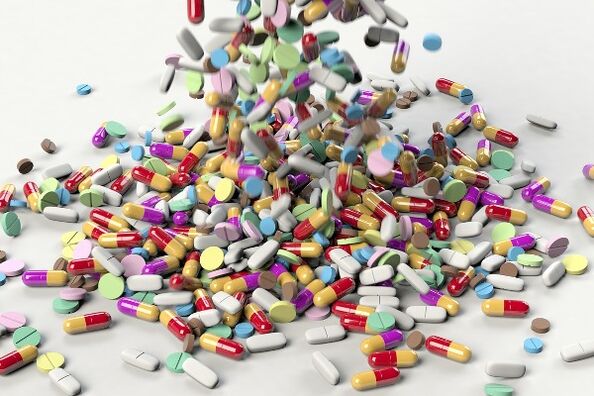
antibiotic
- The drug pipecolic acid is a representative of the clinical and pharmacological group of quinolones. Cystitis tablets are used in practice to treat bladder lesions caused by Proteus vulgaris, Klebsiella pneumoniae, Pseudomonas aeruginosa, Escherichia coli.
- The drug works quickly because it contains the latest generation of antibiotics - phosphonic acid derivatives. The drug reaches a maximum concentration in the urine and can significantly shorten the treatment time. One day of administration is sufficient to eliminate pathogenic and opportunistic microflora of all bacterial origins. A single dose of the drug is used only for acute pathologies.
- Fluoroquinolones are powerful antibacterial agents to which most Gram-negative and Gram-positive bacteria have not developed resistance. The drug is well tolerated and can be used for both acute and chronic cystitis.
herbal therapy
- A preparation based on thyme herb, lovage roots and rosemary leaves. Cystitis tablets exhibit significant diuretic activity. They are used mainly in complex treatments together with antibiotics and topical antiseptics. This medicine for treating cystitis in women also has antispasmodic, anti-inflammatory, and antibacterial properties.
- Product contains fir oil, peppermint oil, castor oil, wild carrot, hops, oregano extract. These include tablets to treat cystitis and thick solutions that smell like medicinal plants. It is a natural antispasmodic. The demand for this herbal remedy for cystitis is due to its complex effects on the bladder - anti-inflammatory, antiseptic, diuretic.
- Medication containing cranberry fruit extract and ascorbic acid. The pharmacy assortment has recently been supplemented with this drug for the treatment of cystitis in women. Its therapeutic effect is based on the pharmacological effects of dried cranberry extract. When using this medication to treat cystitis in women, you should consider that it is a dietary supplement.
Herbal remedies for cystitis have proven their good results in treatment. This thick paste used to prepare the drink eliminates all pain symptoms within a few hours. Most commonly used to relieve exacerbations of chronic cystitis.
Antispasmodics
- Cheap cystitis tablets from the group of isoquinoline derivatives whose effectiveness has stood the test of time. The pharmacological properties are similar to opium alkaloids, but the duration of action exceeds that of opium alkaloids. This medication for cystitis reduces the tone and motor activity of the smooth muscles of the gut.
- Structural foreign analogues of the former drug, a quick help in the treatment of cystitis. One pill is enough and the persistent pain in the lower abdomen will disappear within a few minutes.
NSAIDs
- A sulfonamide anti-inflammatory drug used to treat cystitis of any origin, eliminating burning and cramping during urination.
- An inexpensive cystitis drug derived from a propionic acid derivative that works well against both acute and chronic inflammatory processes.
- Effective tablets from the group of phenylacetic acid derivatives for the treatment of cystitis in women who often experience false urges to urinate;
- A drug in the Oxycontin group used to treat cystitis in women and men where the source of infection spreads rapidly.
- Cheap and effective tablets from the group of propionic acid derivatives, quickly stop the inflammatory process and reduce the severity of pain and burning sensations.
Medications from the NSAID group are not effective for longer than 10 days in treating chronic cystitis in women. One significant side effect of these pills is ulceration of the stomach lining. Therefore, it is recommended to take proton pump inhibitors together with the treatment of cystitis in women.
antifungal agent
- Effective in treating cystitis caused by Candida. This triazole derivative interferes with the biosynthesis of ergosterol, which is necessary for the construction of cell membranes by infectious agents.
- Best treatments for fungal cystitis. An antifungal drug, a polyene antibiotic that disrupts the permeability of cells of pathogenic microorganisms.
- Polyene macrocyclic antibiotics with antifungal activity. The best medicine is in solution form. It is fungicidal or fungistatic, depending on the concentration in biological fluids and the susceptibility of the pathogen.
Disease-causing drugs
- Acute cystitis can be perfectly cured with phosphonic acid derivatives in the form of single-dose tablets, as well as quinolones;
- If chronic cystitis occurs, in addition to antibiotics, immunomodulators and immune enhancers are needed.
Drugs to treat non-infectious cystitis
Remedies for recovery after cystitis
- immune booster. Medications can strengthen the body's defenses, which becomes a good preventive measure against the development of future diseases.
- Balanced complex of vitamins, trace elements and macroelements. Strengthens the immune system and improves mental and physical performance.
- A drug that repairs mucous membranes. Eliminates exacerbations of the condition, eliminates residual symptoms of the disease by increasing bladder capacity and the interval between the urge to urinate, and regenerates tissue.
Other drug groups
Doctors often prescribe sedatives. Cheap medicines with a sedative effect - alcohol tinctures and valerian, motherwort tablets. They help eliminate tension, anxiety and improve sleep quality.
























